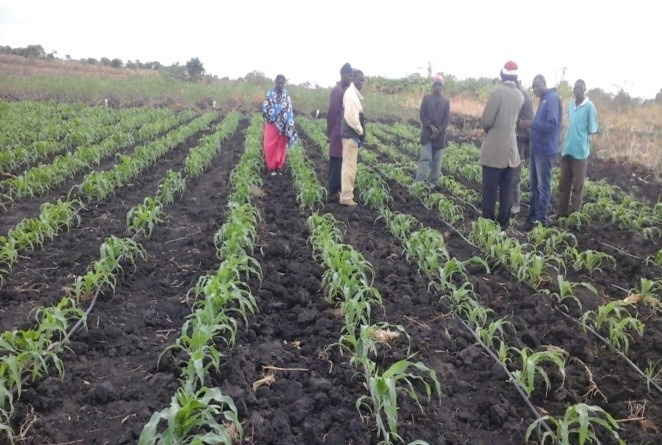
Two-week old BASF/SEEDCo maize under drip irrigation. Stella Star herbicide was used to control weeds.
One of the key objectives of the ACDI/VOCA-implemented Production, Finance, and Improved Technology Plus (PROFIT+) project is to increase private-sector investment in agriculture. PROFIT+ is a USAID-funded Feed the Future activity in Zambia. In May 2015, an account manager from German chemical producer BASF visited the PROFIT+ Chipata offices to communicate BASF’s desire to work with PROFIT+ through the project’s community agrodealers (CAs). CAs connect agricultural service providers with rural smallholder farmers to boost their profits and productivity. The PROFIT+ partnership with BASF will enhance market system development in rural areas to allow for a permanent transfer of services, resources, and capital from key stakeholders to farming communities.
BASF and PROFIT+ Trainings and Demo Plots Illustrate Product’s Effectiveness
In July 2015, PROFIT+’s COR met with BASF Managing Director for Southern Africa and its account manager to further explore the possibility of working with PROFIT+’s CAs. In September 2015, BASF and MRI Syngenta trained 183 CAs and lead farmers (69 of whom were women) in the use of Stellar Star herbicide during one-day product knowledge trainings in Lundazi, Chipata, Katete, and Petauke districts. Stellar Star is a selective herbicide that controls weeds in maize. Farmers like it because it is selective and only destroys grass. It can be used on maize when it is less than three weeks old and it has a flexible application window and does not require adjuvants. It is available in small packs and is compatible with conservation farming. Finally, it is cost effective and saves time compared to hand weeding.
To demonstrate the use of Stellar Star, the project selected 15 CAs (two of whom were women) to host maize, soybean, and sorghum demo plots. BASF dubbed the demos “Dimba Demos” because the crops were planted in 20m x 20m gardens. “Dimba” is the Nyanja word for garden.
In Lundazi district, PROFIT+ selected two CAs (one woman) to receive soybean and sorghum seeds, two bags of fertilizer (one basal, one top dressing), and five varieties of maize seed. In Chipata, the project selected three CAs (one woman), while in Katete and Petauke, PROFIT+ selected five male CAs to receive the inputs. BASF and SEEDCo paid for the inputs. BASF, SEEDCo, and PROFIT+ jointly monitored the demo plots.
Well-Attended Field Schools Spur Interest in Herbicide and Good Agricultural Practices
In December 2015, PROFIT+ and BASF hosted four field days in Katete. Nearly 400 farmers (of whom 133 were female) attended the event to see the effectiveness of Stellar Star first hand. Other attendees included representatives of the Ministry of Agriculture, the Zambia National Farmers Union (NFU), the Conservation Farming Unit (CFU), and village headmen. BASF also distributed 80 x 80 mls bottles of Stellar Star to 40 CAs for use in maize during the 2015/16 farming season.

In April and May 2016, BASF held 15 field days in all four districts with 978 farmers (320 women) attending. The attendance was low because the field days were scheduled during a time when the crops had dried up. March would have been a better time to hold the field days as the crops would have still been fresh and farmers could have more easily compared their fields to the demo plots.
After attending the field days, farmers became interested in buying Stellar Star and producer companies (PCs) have taken the initiative to do business with BASF this upcoming 2016/17 farming season. PCs have already held three business meetings with BASF at which they have placed orders for Stellar Star and other agro chemicals needed by farmers in their communities. BASF asked PCs to make an upfront down payment of 40 percent of the agrochemicals’ total cost. As of October 2016, one PC in Katete has paid ZMW9,500 ($962 USD), three PCs in Chipata paid ZMW12,700 ($1,285 USD), and two PCs in Petauke paid ZMW14,150 ($1,432 USD) of the required amounts. The project expects BASF to deliver the products to the PCs shortly.







